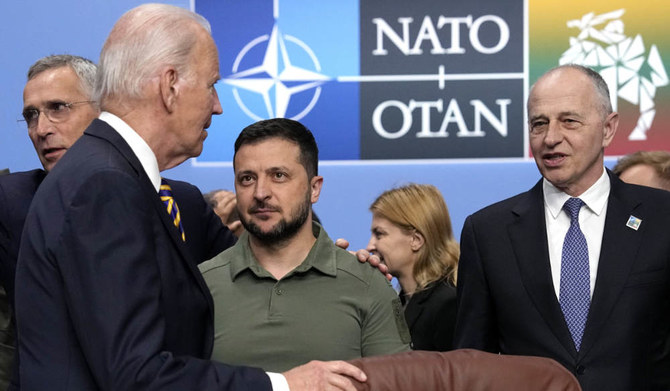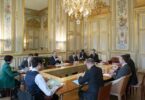Yossi Mekelberg
It was somewhat symbolic that this week’s NATO summit took place in Vilnius, the capital of Lithuania, a country with a long history of domination by Russia and the Soviet Union. It served as a stark reminder of what is at stake for the members of the Western collective security organization.
This was one of the most consequential NATO gatherings for many years, one that no doubt helped the alliance to redefine itself, not only in the face of a common enemy, Russia, but also as it basked in the unexpected success of playing a crucial role in preventing the Russian army from instantly taking over Ukraine — and doing so without having to send any of its own troops onto the battlefield.
There is a sense of deja vu in NATO’s return to prominence in terms of protecting the security of its members and partners from external aggression. In 1949, when the 12 founding countries signed the North Atlantic Treaty, the aim was to contain the ambitions of Moscow, and that was high on the agenda once again this week in Vilnius.
Back then, ironically, quite a few of the current member states of this intergovernmental military alliance were either part of the Soviet Union or within its sphere of influence, mainly as a result of Russian coercion, while today they are looking for protection from Putin’s Russia.
Only last month, NATO conducted a massive military exercise in which more than 3,500 troops equipped with drones and armored vehicles were deployed to test the capabilities of the Lithuanian army’s Iron Wolf Brigade — in other words to prepare for any future Russian invasion.
In the period immediately after the Cold War ended, NATO suffered from a mixture of partial hibernation and a prolonged victorious hangover, with only occasional reminders of why it was still necessary for ensuring and protecting the security and values of its members.
However, Putin’s Russia, and above all its war on Ukraine, has revitalized the organization and given it a clear, renewed sense of purpose, even though neither of the warring sides are NATO members.
For nearly a decade, NATO Secretary-General Jens Stoltenberg has been the glue that kept it together and the driving force behind the necessity for it to adapt to a fast-changing security environment; as a result, he seems almost irreplaceable.
He said, while observing the military exercise in Lithuania: “This exercise sends a clear message: NATO is ready to defend every inch of Allied territory.” He added, “We are demonstrating that we can also reinforce quickly, whenever needed.”
The task of the two-day NATO summit this week was to demonstrate the commitment of member states to a strong alliance, which is not only essential for the security of all of them and the preservation of liberal democracies, but also for global stability and the prevention of wars.
Much of the talk leading up to the summit was about the prospect of Ukraine’s future membership of the organization, while in the background America’s controversial decision to supply cluster munitions to Ukraine in support of its counteroffensive against Russian troops was causing some unease among European members.
To be sure, President Volodymyr Zelensky’s demand that his country be allowed to become a member of NATO is, in principle, understandable and justified. But the decision not to begin any formal discussions about this until the war is over is equally logical.
Kyiv knows that public opinion across the West is very sympathetic, and rightly so, toward the heroics of the Ukrainian people, not least Zelensky’s leadership. But had the summit decided to establish a process and a time frame for Ukraine’s membership of NATO, it would only have angered Russia further and raised fears among many people in member states that it would result in NATO troops being deployed to fight in the war.
At the root of Ukraine’s success in the war so far has been the admirable leadership of its government, its president first and foremost, the courage of its people, the improvisational skills and adaptability of its military, and the foreign support it has received without soldiers from other countries helping to fight and die for the cause. Any attempt to tamper with this would have done more harm than good.
For NATO to maintain its support for Ukraine, it is imperative that its members avoid taking unilateral decisions, such as the one by the Biden administration to supply the Ukrainian military with cluster bombs which was controversial among the international community and has also divided opinion among NATO members.
By failing to coordinate with other members over the decision, Washington’s rush to send cluster bombs to Ukraine is bound to leave a long-term legacy of innocent people being further harmed. It was also a sign of weakness in terms of unity and the need to supply Ukraine with alternative weapons that do not flout an international convention signed by more than 100 countries, including many NATO members.
Mutual respect is essential for the preservation of this complex transatlantic alliance, and the summit’s participants left Vilnius sufficiently reassured that the US commitment to Europe’s security is solid, at least until the next presidential election, and that Europe is ready to shoulder more of the responsibility in this regard.
The expansion of NATO, first with the accession of Finland followed by that of Sweden, and then possibly by Ukraine in the aftermath of the war, means that the organization’s commitments will increase, and with this the risk that at some point it will be obliged to defend one of its members against external aggression.
Just imagine a scenario in which Ukraine’s membership had not been vetoed in 2008. This might have resulted in Russia not daring to annex any Ukrainian territory in 2014, or not attacking it in 2022. Or, if Moscow had gone ahead and done so anyway, it would have instigated a war between NATO and Russia — which is not far from being the case now, albeit that currently there is much more room for maneuver to avoid a full-blown, possibly even nuclear, conflict between the two.
As expected, then, Ukraine took center stage at this year’s summit. But other issues were strongly outlined as areas of concern, including rising tensions with Russia over its nuclear proliferation; China’s “stated ambitions and coercive policies (that) challenge our interests, security, and values;” and terrorism and instability in the Middle East, North Africa and the Sahel regions.
This is a cluster of challenges that, for now, the summit managed to navigate without any cracks appearing within the organization, while also avoiding ruffling any feathers among NATO’s rivals.
However, while Ukraine remains a common cause for unity, some of these other issues will have to be navigated with great diplomatic skill, especially as the organization expands.







